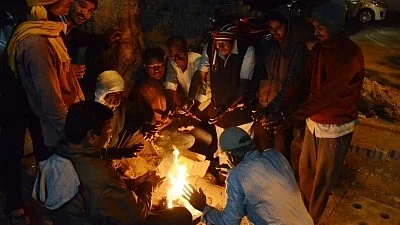Despite stubble burning from the states of Punjab and Haryana having subsided, bad air quality to haunt the Indo-Gangetic plains, however the pollution levels in December have been considerably better as compared to 2021.
The Air Quality Index in this last month has fluctuated between the 'poor' and 'severe' categories.
The reason for the high rates of pollution detected over North India has been identified as a phenomenon called 'winter inversion'-- where cooler air is trapped under a layer of warm air creating an atmospheric blanket of sorts. This has trapped pollutants closer to the Earth's surface giving them a lack of space to disperse into the atmosphere.
The Pollution Recipe: No Rain, Heavier Air, Low Temperature
Since stubble burning has now reduced according to government reports, the elevated levels of air pollution has been due to industrial activities, vehicular pollution and prevailing weather conditions.
Experts claim that in order to aid the dispersion of pollution, cities would need to drastically cut down emissions at the source.
However, winter rain would provide some relief to the ongoing poor air conditions.
Due to the absence of rainfall, wind patterns have been noted to be stable and slow over the entire region. The temperature over the plains have been settling between 4°C-10°C.
The dip in temperature has allowed the north-westerly winds to become heavier because of increased moisture, thus capturing pollutants closer to the Earth's surface.
“Given that meteorological and reduced emission factors are both at play, AQI levels across the Indo-Gangetic basin should have been better had winter rains occurred as expected. With temperatures dipping across the plains in the last couple of days, pollution levels have directly and proportionately gone up."Aarti Khosla, Director, Climate Trends.
Why Has North India Not Received Winter Rainfall?
The lack of winter rains is unexpected because by this time of the year, North India is expected to have witnessed at least one or two bouts of winter rainfall and snowfall. This lack of rainfall has been correlated to the absence of Western Disturbances (WD) in the Himalayan region.
November witnessed five passages of WDs in North India, according to the Indian Meteorological Department (IMD). This led to scattered snowfall in the Western Himalayan region and rainfall in adjoining areas. Since rainfall already occurred earlier in the winter season, December has only been experiencing feeble WDs which has had no effect on the weather pattern thus far.
WDs are responsible for governing weather patterns over the North-western plains, most significantly during winters. The stronger Western Disturbances trigger rainfall and snowfall.
Alongside WDs, factors such as the La Nina-- an atmospheric phenomenon occurring over the pacific ocean--have contributed to the current weather pattern, say experts.
"Large scale meteorological phenomena like La Nina are also contributing by slowing down the circulations. We need more ‘Early Warning Systems’ to predict air quality. These systems could let us know what is the relative contribution of slowed weather systems.”S N Tripathi, Professor, Civil Engineering dept, IIT Kanpur.
Since, rainfall and snowfall would aid in reducing the pollutants in the air, the lack of both has led to high levels of pollution in the atmosphere.
However, in spite of the prevailing weather conditions, pollution levels in 2022 are still noted to have been lower than that of 2021, specifically PM2.5.
